Wheatstone GSX-1208
083304
<tc>Prix régulier</tc> $31,885.00
Wheatstone GSX-1208 Programmable Broadcast Digital AoIP Console
Includes:
- 12 Fader GSX frame with;
- 1 Monitor Panel (WS# 012501)
- 2 4-Fader Input Panels (WS# 012500)
- 1 PSE-1600 Power Supply (WS# 007533)
- 1 Power Supply Cable (WS# 007505)
- 1 GSX User Manual
- 1 BLADE Mix Engine (WS# 011016)
GSX brings all of Wheatstone's innovations together into a ready-to-go console/control surface that can easily handle the fast-changing roles of modern broadcast studios. It's a turnkey console that's based on our LXE – the first completely customizable control surface for IP audio systems.
While it's delivered fully configured and ready to fly, GSX is customizable. Virtually every knob, every button, every display can be programmed to accommodate virtually any application you come up with using our optional ConsoleBuilder™ software.
Additionally, features such as Automix, Layers, ScreenBuilder™, Smart Switch panels, and IP accessories can be added at any point to adapt your GSX to your evolving needs.
GSX's modular design makes for flexible installations. The 4-fader input modules (or 2-fader/3-space master module) can be flush mounted right into your table, easily splitting them as you need, and connected to your network with a single CAT6 cable.
GSX interfaces seamlessly into the WheatNet-IP Intelligent Network, and utilizes BLADEs for audio, control and associated logic data flowing on single CAT6 interconnecting cables. The system can ingest and convert virtually all audio formats: mic and line level analog, AES/EBU, SPDIF, AoIP, MADI, SDI and even AES67. Loudness metering, phase control, and full EQ/Dynamics are included.
Meters are On the Screen...
GSX has moved the meters from the console to the graphic interface on-screen, giving you a low-profile workspace that lets you focus your attention where your eyes spend most of their time. The touchscreen GUIs let you interact with your audio to do everything from pinching and dragging EQ to setting up router crosspoints in your network. Optional ScreenBuilder™ GSX software enables you to create your own touchscreens. And optional ConsoleBuilder™ is a GUI-based app that allows you to program and configure your hardware surface.
Physical Surface:
- Form Factors:
– Wedge low profile (no meterbridge, surface pairs with separate HDMI monitor)
– Countertop drop (flushmount)
– Both choices can be split consoles connected via network in same room or different rooms/locations
- Option: Fully Programmable / Configurable via ConsoleBuilder™
– Every button configurable via setup GUI; can be scriptable, or a variety of other functions
– Every encoder/knob configurable from the setup GUI, Can be scripted (if X then Y) or assigned to other knob or encoder functions.
– Fader is scriptable to control things via ACI like Utility mixer channels.
– Multicolored fully programmable LED buttons throughout (blue, cyan, green, yellow, red, magenta) (talkback and cue are red only)
– Full color OLED display on each channel configurable for contextual display
- Built in Ethernet switch for plugging in accessories or other host panels
- PureIP – connects directly to switch
- Four stereo Program busses
- Four stereo Aux busses
- Four mono or stereo Mix-Minus busses
-
Headphone stream to surface - up to one per panel host
-
Each input channel offers Phase control, Panning, Fader mode Left, Right, Mono, Stereo - each assignable to any knob/button
-
Mono cue speaker
-
Up to 24 physical faders (virtual faders can be controlled via ACI for third-party flexibility)
-
Every fader has bus-minus or direct out and is configurable as stereo or mono
-
Fader mirroring – allows faders to mirror one another in different locations
-
Option: 8 layers (to accommodate up to 32 input fader channels) – completely customizable and configurable for each layer.
-
Separate Control Room, Headphone, and Studio monitors, each with monitor dimmable (all with friendly names)
-
Monitor mix capable – mix all busses together for monitor output
-
Monitor Linking (example: Headphone follow Control Room)
-
Level lock for Monitors
- Dynamics, including Compressor, Expander, Gate, controlled via touchscreen or optional panel
- Full Parametric EQ controlled via touchscreen or optional panel. Includes highpass and lowpass filters
- Flexible Metering Options:
– Loudness metering
– Phase Correlation metering
– Input metering on each channel
- Option: Automix function controlled via touchscreen GUI
- Info screen on surface for current status
- User management:
– Logging in and out
– User based access to controls
– VDip saved per user settings
- Unlimited number of events
- Support for remote mix engine (off premises, for use with At-Home systems)
- Time sync to NTP via mix engine
- Display brightness controls
- Accessory panels powered internally
Touchscreen GUI:
- Complete set of screens provided to allow control over every aspect of the GSX control surface
- Option: ScreenBuilder™GSX with support for unlimited number of screens (which run one at a time) allows you to build any type of custom screen you need
- Configurable Home screen with up to 8 Monitor, 4 Aux, 4 Mix-Minus meters
- Linux based OS with touchscreen support accessible via HDMI video output
- Full screen XY controller built in
- Digital timer and clock on home screen
- Add custom logo to clock background
There are two basic modules on the GSX - a four fader input module, and a master section with two faders. There is also space in the frame for additional modules, such as the SS-8 with programmable OLED buttons.

OLED Screens on the GSX Surface

The small, full-color OLEDs in the modules on the surface provide whatever information is pertinent to what you are doing at any point in time. Turn a knob or push a button and a screen will provide the info you need. These are fully scriptable to present the data you need, when you need it.
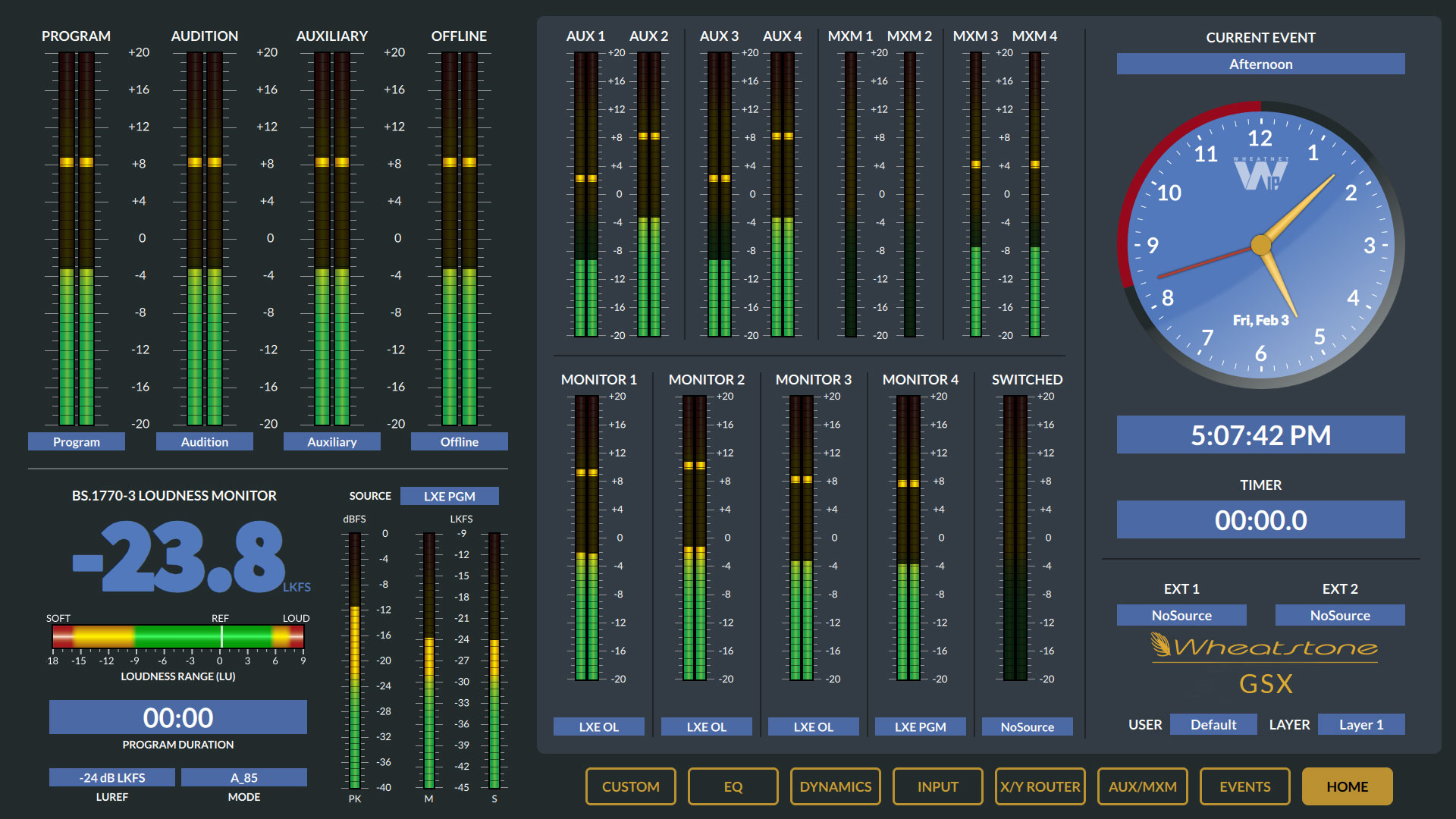
The GSX GUI features a “button” navigation architecture to easily access features with a minimum number of clicks. These Function buttons are located across the bottom of the function display area. You may access any desired screen by simply clicking or touching the appropriate button.
GSX Optional Expansion
GSX's architecture, with a built-in Ethernet switch, lets you add functionality to your console at any time. Add panels, such as the SS-8 with OLED buttons that can be programmed to do just about anything you want. Or, add functions, like AutoMix or Layers. And, for personalizing your workflow, there's ConsoleBuilder and/or ScreenBuilder to customize your physical surface or your touchscreen interfaces.
GSX Automix - Ultimate Control
When airing a panel discussion, forum, or other program where many microphones are located close together, audio operators have their work cut out for them. Simply leaving all the mics open all the time will result in an ugly, comb-filtering effect that will make the room sound hollow. The operator must constantly pay attention to the discussion in progress, and keep unused mics pulled down. There are many opportunities for errors which are obvious to the audience. Optional Automix (Automatic Microphone Mixing) takes this difficult task out of the hands of the operator.
By engaging this feature on each of the microphones, the operator allows the console to monitor the level coming from each microphone and automatically reduce the gain on mics not being addressed. The level of all participating mics is determined by the weighting assigned to each channel by the weight sliders in the Automix screen. This allows hosts to be assigned a higher weight in order to speak over guests in a lively discussion. It also allows “loud talkers” to be assigned a lower weight so they are more evenly balanced with other speakers. Conversely, “soft talkers” can be assigned higher weighting to compensate for their lower level. The Automixer also does gain sharing, so the overall level will not exceed nominal levels when multiple participants are speaking at once.
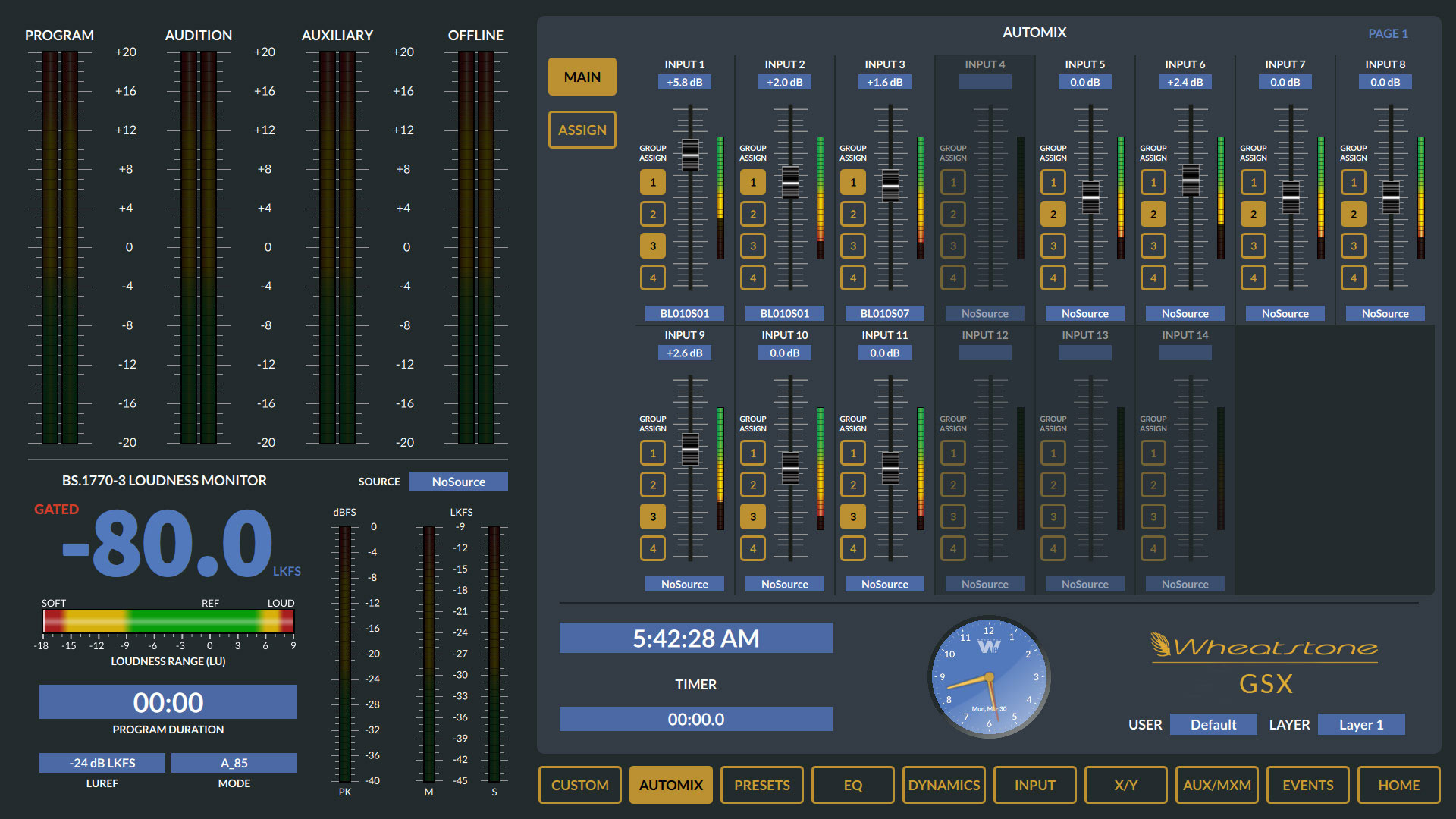
Layers = Compact + Huge
With optional LAYERS, you can get up to 32 input channels with as few as four physical faders. You can have, for example, 8 physical faders, each with four layers. So, you can have up to 32 actual input channels - 8 per layer. Up to 8 layers are available to give you a maximum of 32 input channels. This gives you enormous power in a VERY compact space.
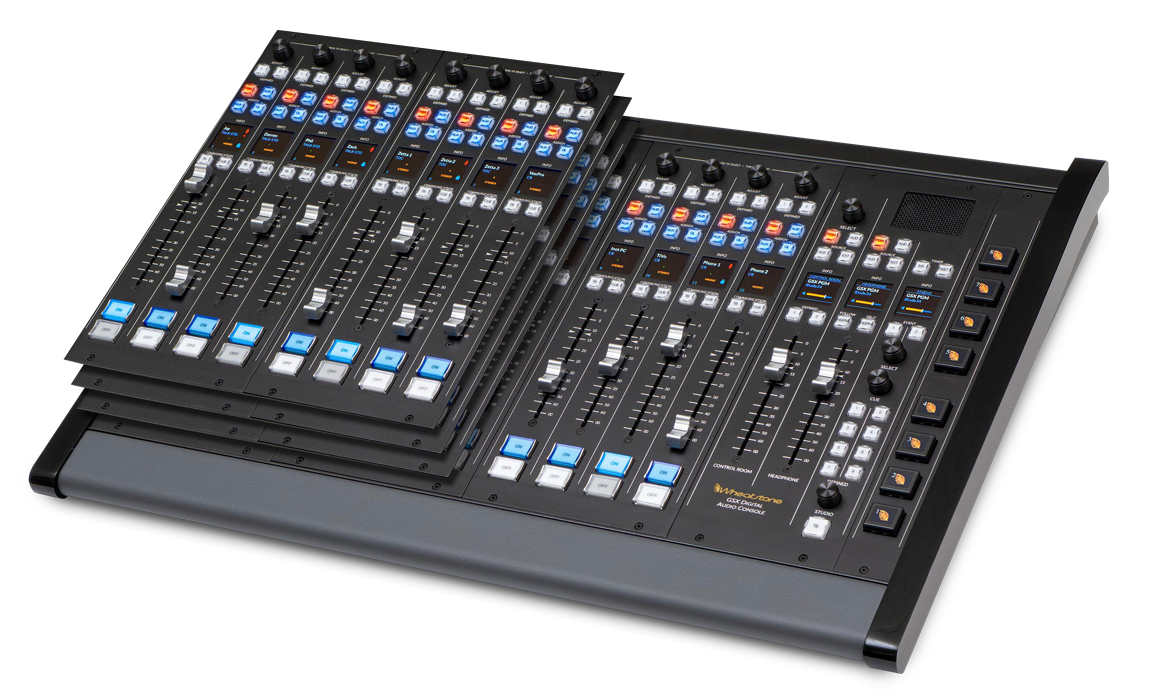
Remote GSX - Control from Anywhere
Optional Remote GSX is a multi-touch virtual console that mirrors the GSX control surface for an independent, yet shared user experience during fast-paced, multi-operator shows and productions.
It remotely controls the GSX hardware surface as a fully functional and studio-ready user interface, complete with like buttons and knobs as well as familiar navigation and menuing options for setting EQ curves, filtering and other custom settings.
Working in conjunction with the GSX hardware surface, Remote GSX provides complementary production functions for separate operators using an GSX board in the same location or in another location over an IP connection. Real-time fader tracking and live synchronization of buttons and controls between the virtual surface and the physical GSX board offer an independent, yet shared user experience for multiple operators – or as a tool for engineers to remote in to correct operator setup issues.
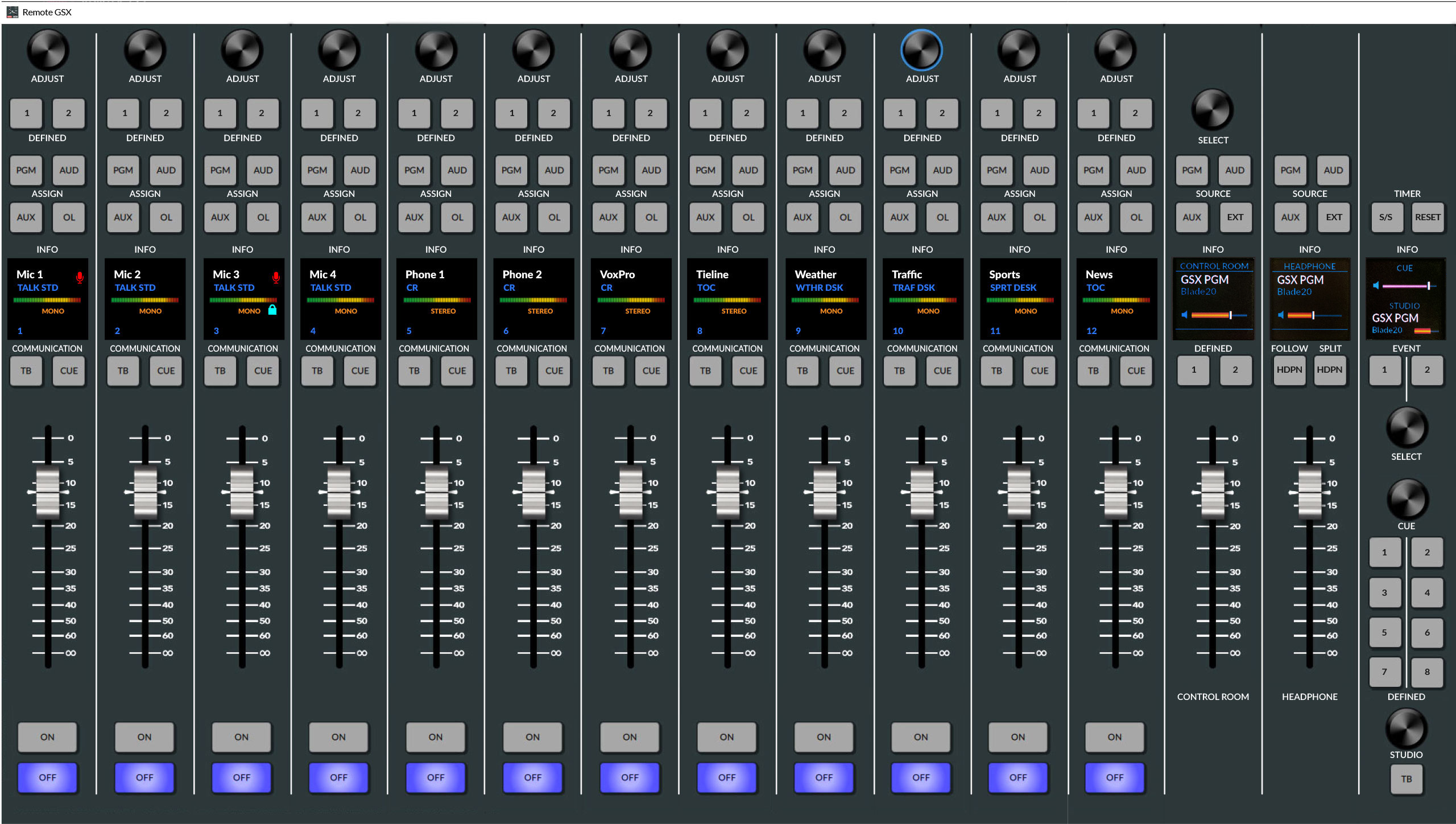
ConsoleBuilder™ GSX
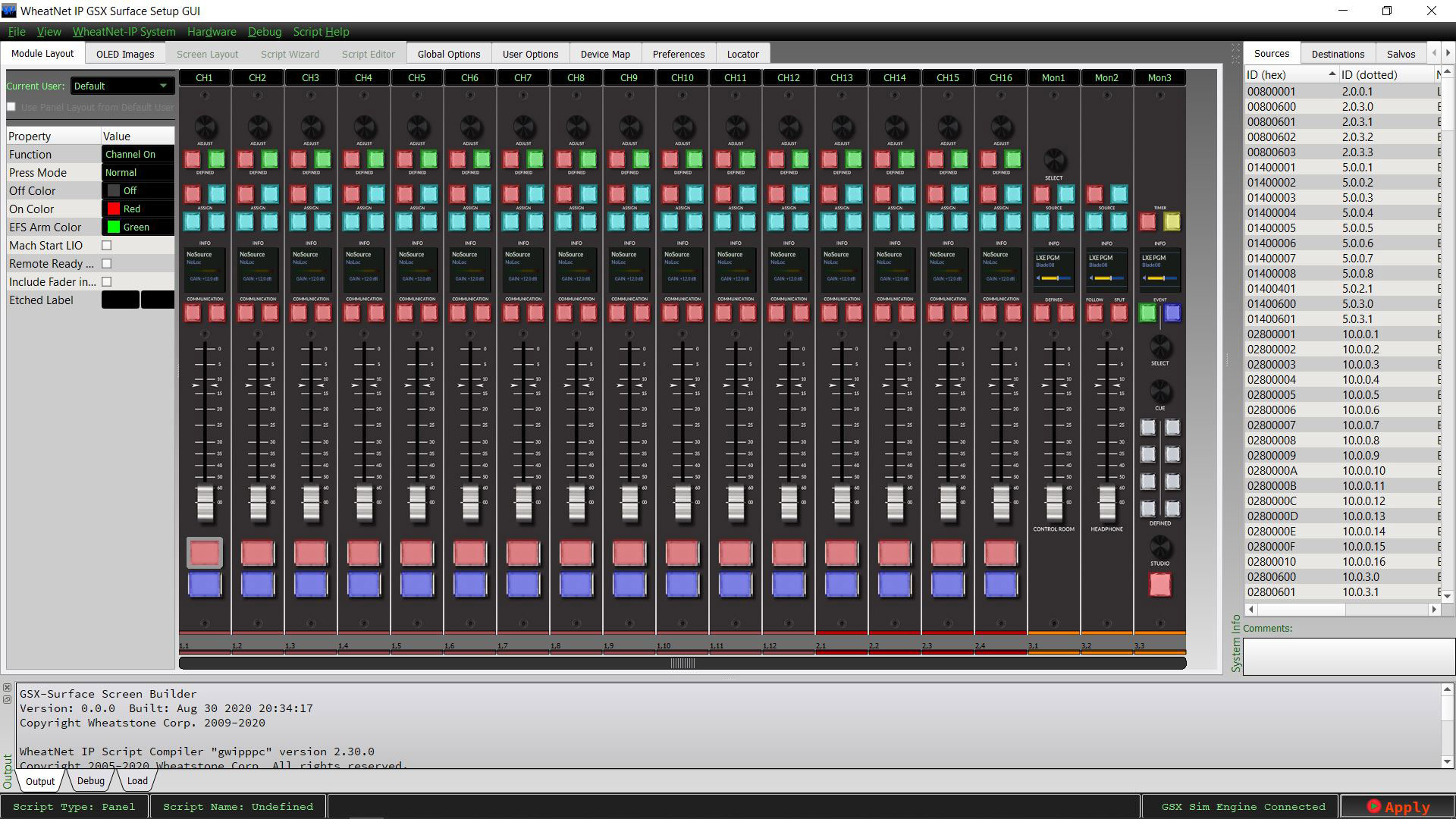
The GSX comes ready to go out of the box, pre-configured for standard broadcast workflows. But with broadcast audio becoming anything but ‘standard’, GSX's powerful flexibility is fully revealed when you use the optional ConsoleBuilder™to configure and program it to fit your own studio. ConsoleBuilder is a drag/drop/scripting software GUI that packs an exceptional amount of power behind an easy-to-use interface. With it, any of over 25 functions can be assigned to just about any knob, button, or fader on the control surface.
Here’s how it works: the display shows you the layout of your physical console – just double click on the surface feature you want to customize (switch, knob, fader, OLED display) and using the drop-down menu, select the function you’d like to assign to it. If you require more complex programming, you can even script things to achieve the exact level of control you need. Many GSX GUI functions can be customized as well.
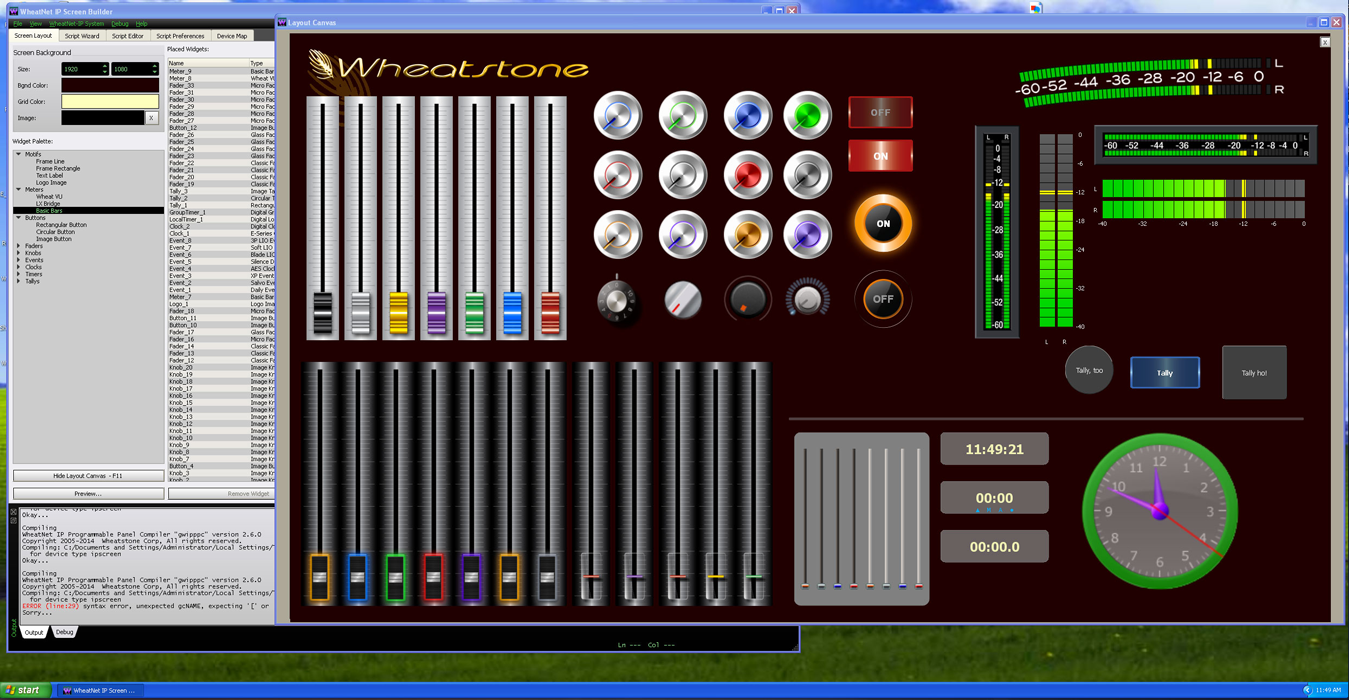
GSX's GUI has pre-built screens for everything you normally use – metering, clocks, timers, dynamics, EQ, assigns, and more. All are touchscreen accessible with the same gestures you’re used to using on your smart devices.
However, this touchscreen GUI is just as customizable as the GSX surface. Using our ScreenBuilder™ GSX software, you simply drag and drop objects to build custom touchscreens, defining their functions via a simple wizard interface. You can then easily store these custom screens to go with your custom GSX setups.
ScreenBuilder™GSX comes stocked with widget graphic elements: meters, faders, knobs, buttons, tallies, etc., all ready to drag, drop, and configure. You can also add your own graphics, and assign functions to them using our script wizard. We’ve seen studio mic plots, simple on/off talent panels, even maps of entire countries showing all transmitter locations – it’s pretty much wide open. If you can conceive it, you can achieve it.

Inset photo, Cool feature: ScreenBuilder GSX lets you customize the clock on your home screen by adding your own logo...
GSX LITERATURE:



















